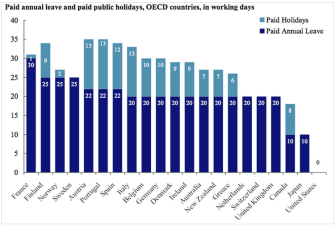Why Do Americans Have Less Vacation Time than Anyone Else?

For most Americans, Christmas week represents about half of the time off we will enjoy all year long. Compared with Australians (at least 4 weeks off, plus 10 public holidays), Brazilians (22 days of paid leave with a 33 percent salary vacation bonus) and the French (at least 5 weeks off and as many as 9 for many public employees), we are seriously bereft.
Look at how the United States stacks up against the rest of the developed world in number of mandatory days off each year:

Yes, that’s a big fat goose egg. And yes, the United States is the only OECD country that does not require employers to provide even a day of paid leave to its employees. As the Department of Labor states matter-of-factly, “The Fair Labor Standards Act (FLSA) does not require payment for time not worked, such as vacations, sick leave or federal or other holidays. These benefits are matters of agreement between an employer and an employee (or the employee’s representative).”
Ah, to live and work in the world’s only superpower.
Does it have to be this way?
Recently, Robert Reich put forward a modest proposal that Congress should mandate a minimum of three weeks of vacation for every American worker:
Most Americans only get two weeks off right now. But many don’t even take the full two weeks out of fear of losing their jobs. One in four gets no paid vacation at all, not even holidays. Overall, Americans have less vacation time than workers in any other advanced economy.
This is absurd. A mandatory three weeks off would be good for everyone — including employers. Studies show workers who take time off are more productive after their batteries are recharged. They have higher morale, and are less likely to mentally check out on the job.
This means more output per worker — enough to compensate employers for the cost of hiring additional workers to cover for everyone’s three weeks’ vacation time.
But for the foreseeable future, vacation guarantees are not likely to appear on any lawmaker’s agenda of top priorities any time soon.
Image credit: Shutterstock.com
Follow Steven Mazie on Twitter: @stevenmazie





